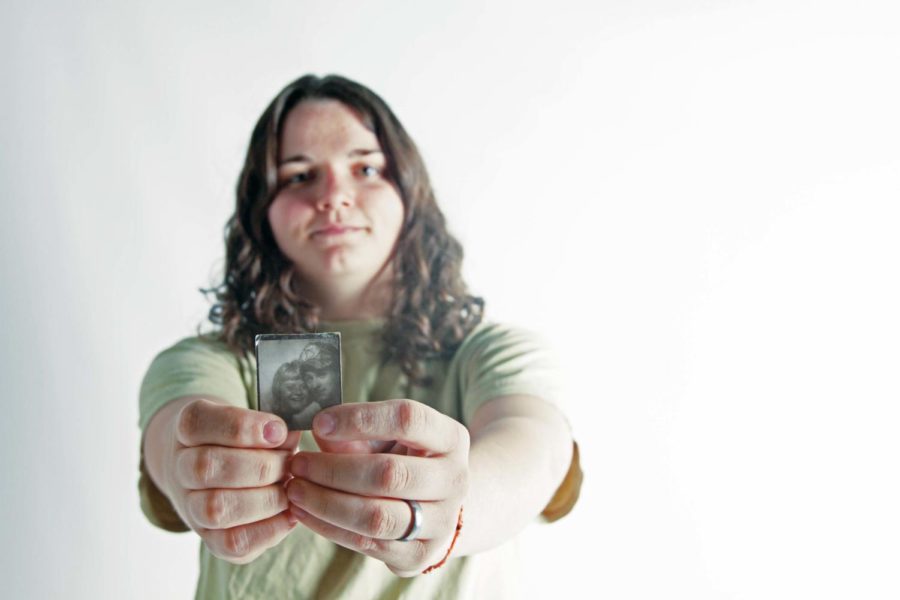After mother’s overdose, daughter finds strength in loss
Photo: Kelsey Kremer/Iowa State Daily
Amber Connett, senior in agricultural and life sciences education, holds up a photo of her mother and father from when they first began dating. Connett’s morther died in 2008 from misuse of perscription medication. She carries that photo with her every day in her wallet.
November 15, 2011
Amber Connett keeps a faded black-and-white picture inside her wallet at all times. The picture is of her parents, smiling in a photobooth in a time when big hair and trucker hats were in style.
Connett said she doesn’t know the exact details of where or why the photo was taken. But to her, that doesn’t matter. The significance of the photo is derived from what it represents: a time when her parents were both alive and in love — before her mom was addicted to prescription drugs.
Decades after the photo was taken, Connett, senior in agricultural and life sciences education, sat in a wooden chair in a secluded section of Parks Library. She reached into her back pocket to pull out her wallet and removed the photo of her parents.
“It’s from when they first started dating,” she said. “I don’t get it out much because it’s pretty old and about to fall apart.”
Connett flipped the photo over to reveal a message from her mother to her father. It read:
“Donnie, I love you dearly and I hope we’re together till death do us part. Love, Jennie August 22, 1987.”
Donnie and Jennie Connett were together until Tuesday, Dec. 9, 2008. On that day, Jennie died from a drug overdose.
Beginning of an addiction
Amber said her mom told her that her prescription drug addiction began soon after Amber was born. She said she did not notice her mother’s addictive behavior until her grandmother’s funeral in 2003.
“Going to the funeral, she was kind of out of it,” Amber said. “I just thought she was depressed, but right there afterward, I started noticing more and more and more.”
Jennie was normally a fun-loving, “crazy” person, Amber said. When she was on prescription drugs, Jennie was distant and spacey, Amber explained.
“After she got the medicine — if she was on it — she just wasn’t there,” Amber said.
Few people in their hometown of Reasnor, Iowa, knew of Jennie’s addiction, Amber said. She explained that the situation was “hush, hush.”
While Jennie’s addiction was kept out of the public eye, signs of her addiction were ever-present in the Connett household, Amber said. She said she even witnessed exchanges her mother had with people to buy or trade pills.
“I would be in the car, but I couldn’t do anything about it,” she said. “I would just let it happen.”
Getting worse
Amber said her mother’s addiction became significantly worse when Amber was a senior in high school. At that point, Amber’s sister Jessica, now 23, had just moved out and Amber had been talking about moving away to go to college. Amber said she thinks her mother’s downfall may have been linked to her mother having the “empty nest syndrome.”
“I don’t know if she just panicked and thought she was going to be alone,” Amber said. “I was almost afraid to go to college. I thought maybe I should go to DMACC and stay home to take care of mom.”
Amber said she knew that if she went to college, she would have been the first to do so in her family. So she decided to take the leap and apply at Iowa State.
“My mom was so proud when I was accepted,” she said. “She became a diehard Cyclones fan.”
As Amber was settling in at college, Jennie was quitting her prescription drug habit, Amber said. However, her sobriety didn’t last and she eventually relapsed.
Dying day
On Dec. 9, 2008, Amber was sitting in a lecture class at Curtiss Hall when she received a text from her boyfriend, Marcus, saying that she needed to call her dad because her dad was getting arrested and he wanted her to come home immediately.
“I was like, ‘Why is he going to jail?’ I thought that was weird,” she said. “I thought he was joking.”
Amber left her class and went to the foyer in Curtiss Hall to call her dad. When she was talking to him on the phone, Amber began to realize why he really wanted her to come home.
“A lightbulb popped up in my head and I said, ‘Where’s Mom?’ and he said, ‘I can’t tell you,'” she said. “He didn’t want to tell me about my mom over the phone.”
When Amber arrived at her family’s home later that day, she said Jennie’s body had already been taken and only a stain on the bed and the smell of tea and vomit remained in her room.
“What I think happened was that she was so out of it, and she was lying on her back, that she got sick and choked on her own vomit,” Amber said.
According to the Iowa Office of the State Medical Examiner, the cause of Jennie’s death was mixed drug intoxication or overdose.
A growing national problem
In a Nov. 1 press release by the Centers for Disease Control and Prevention, it stated that the number of deaths due to overdoses of prescription painkillers has tripled in the last decade.
Scott Kickbush, director of the Central Iowa Drug Task Force, said he has noticed an increase in prescription drug abuse cases in central Iowa.
“It’s really uncommon to do a search warrant drug bust and not have some sort of illegal prescription drug at the scene,” Kickbush said.
Kickbush said there are a variety of prescription drugs people are selling, buying and trading. Some of the most popular drugs are hydrocodone, codeine, Adderall and OxyContin.
“If there’s a market for it out on the street as far as people selling individual pills, we’re seeing it,” he said. “Where there’s a need, people are finding it.”
Kickbush said he has seen all sorts of different people who abuse prescription drugs. He said some abusers are professional men and women or mothers and fathers.
“It hits all demographics,” Kickbush said. “There’s not one person you can put your finger on and say, ‘That person is a prescription drug abuser.'”
Prescription drug abuse is also hard to monitor because prescription medication is so abundant in society, Kickbush said.
“Honestly, we live in a society where, when people have aches or pains, they run to the doctor and want a pill,” he said. “And the doctor prescribes it to them and the pharmacist fills it.”
Gaining from the loss
Amber is not one of the people running to the doctor for medicine, she said. She explained that she has a strong aversion to prescription medication ever since her mother’s death.
Now, she said she realizes how abundant prescription medication is in America and urges people to speak up if they believe someone they know has a prescription drug addiction.
Amber said she blames herself for not speaking up about her mother’s addiction.
“I always thought, ‘Just call the cops,’ or ‘Do something cause she’s going to die if you don’t,'” she said. “And then she did die.”
While Amber said she wishes her mom wouldn’t have been addicted to prescription medication, she said she believes her mother’s addiction made her a better person.
“I wish she hadn’t been on them, but I know if she weren’t, I wouldn’t be such a hard worker,” she said. “I wouldn’t be so dedicated to things.”







